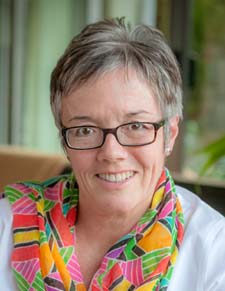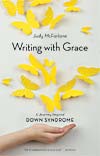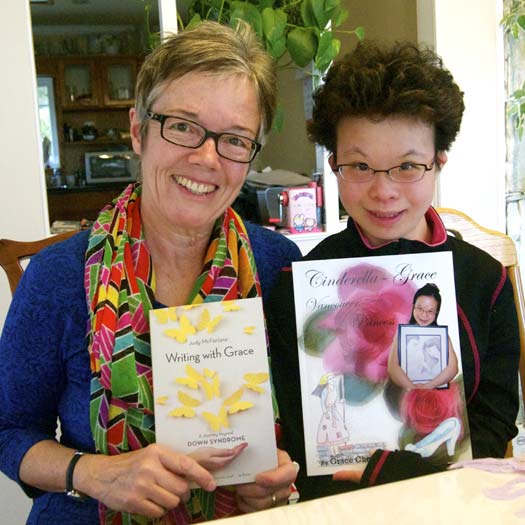Excerpt from Oscar of Between, Part 18A
by
Betsy Warland
3 a.m. deep-sleep-sound sleep impact/shock glass-shatter-scatters across floor. Oscar bolts upright — entire body listens — entry? shouting? Just back from Berlin. Artist’s brass cobblestones embedded in sidewalks here & there in front of flats Jews pulled out of — name, birth date, abduction date, camp name, extermination date inscribed — sudden intimacy of those numbers those names that flat — taking you off guard.
Oscar up. Small flashlight in hand — circle of light searching the floor — then Oscar finds it. No note wrapped around brick but another message. Glass splinters from framed poster for Writers in Dialogue. A feminist literary event between Adrienne Rich and Nicole Brossard that Oscar moderated. Toronto. 1981. Five-hundred people. Adrienne’s recent death passing quietly through the remnants of the feminist community. That brilliant, nearly forgotten, long-broken era swept up in night.
Next day. Oscar strides asphalt sidewalk beside Britannia’s playing field. Pure blue overhead charms strangers into exchanging smiles.
Then. There. Centre of sidewalk — gapping yellow beak — no other remains just mandibles’ arrested shock. Glimpse of unnerving. Oscar dismisses (can’t be) doesn’t break stride. Then stops dead in her tracks. Pivots quickly.
Yellow gapping mouth on black asphalt.
The scream alights in Oscar’s mind.

Outside, Jüdischer Friedhof Prenzlauer Berg, Berlin
Berlin. 2012. Oscar and Ingrid enter the walled cemetery. A short grey-haired woman appears in the lapidary doorway. Calls them over. Ingrid speaks Dutch, a little German. The caretaker speaks German. Oscar speaks neither — watches in confusion, their confusion.
Usually prepared for it, this time Oscar is not.
Then Ingrid gets it: “She thinks you’re a man. You can’t enter unless you wear a kippah.”
Oscar notices the basket of skullcaps. “A yarmulke?”
“Yes.”
Oscar’s mind races — less trouble not to correct people (every customs officer has addressed her as “sir” despite “Sex/Sexe: F” on her passport) — but here, she does not want to risk offence.
What if the caretaker later realizes and feels she’s been duped?
Body language: the urgent translation of.
Oscar enters the fray, says to Ingrid, “Tell her I’m a woman in German.” Then points to her chest and says several times, -“I am a woman. I’m a woman.”
The caretaker’s face softens.
She waves them on.

Guest Writer:
Judy McFarlane
Vancouver, BC
www.judymcfarlane.com

Excerpt from Writing with Grace: A Journey Beyond Down Syndrome
By Judy McFarlane
The house isn’t far from mine. I park and walk along the driveway. Even though it’s late April, the ground is cold, a chill wind blowing up from English Bay. Near the front door, vivid clumps of blue. Grape hyacinths. So hopeful, so reckless.
Another step and a voice wells up inside me. Stop. You’re making a big mistake. I pause, pretend to fish something out of my bag. What makes you think she’ll be able to understand you? Or that you’ll be able to understand her? For all you know, she could be unpredictable, even dangerous.
Willing myself to ignore the voice, I walk to the front door and raise my hand, ready to knock. The voice insists that I pay attention. Now, it says, leave now!
As I stand, hand raised, the door opens. An Asian woman about my age smiles as she bows, a pair of pink terrycloth slippers neatly clasped in one hand. Over her shoulder peeks a slender girl who looks about twelve. Pretty, although her eyes are hidden by the glint from her wire frame glasses.
“Hi, I’m Judy. Madelyne said— ”
“Yes, yes. I am Jessica.” The Asian woman bows again, smiling as she turns to her daughter. “And this is Grace.”
Grace looks up, her eyes dark and intense. “Hi,” she says. “How’s it going?”
I force myself to look at her, smile. Suddenly shy, Grace ducks her head, her long black hair swinging forward. She giggles, poking a finger in her mother’s side. “I’m going to get you,” she sings in a low voice, her face close to her mother’s ear.
“Grace. That is not polite.” A tinge of annoyance in Jessica’s voice.
I step into the front hall and slide off my shoes. The spongy pink slippers now sit on the floor and as I slip them on, I feel an unfamiliar softness, as if my feet are strangers here too. Grace motions me to follow her, leading me across gleaming wooden floors to the dining room. A plastic-covered table, covered with neat piles of papers, notebooks, and pens and pencils laid out in a precise order. Two chairs face a wide window. Grace sits down and pats the other chair, not looking at me. She’s nervous, I realize. Like I am.
“Madelyne tells me you’d like to write.”
Grace nods to the table.
“A book?”
Another nod.
“What do you want to write?”
Grace whispers, “Cinderella.”
I feel a sharp disappointment. Hasn’t this story had every possible variation wrung out of it? Stifling my reaction, I ask, “What will your Cinderella look like?”
Grace looks up, her face suddenly alive. “I’ll show you.” She jumps up and in a moment returns, holding up a blue-black velvet dress. “This. This is what I’ll wear.”
I’m stunned. Does she want to tell her own story?


Featured Reader:
Marilyn Belak
Dawson Creek, BC
I read Oscar’s Salon because…
The conversation provokes my inner dialogue and causes eruptions of creativity.
Profile
Marilyn Belak lives and writes in the northeast of BC. Her poetry has been published in Malahat, Tar, and a variety of newspapers. She is included in anthologies: Enpipeline, Unfurled, and independent chapbook collections. Her chapbooks Out of Saskatchewan and A Poet’s Bird Diary are self–published by Windword Press. She is a past participant of Banff Wired Writing, Sage Hill Poetry and Betsy Warland’s Vancouver Manuscript Intensive. Marilyn is currently working on three manuscripts: poetry, a children’s book and a creative non-fiction collection that includes poetry.




I’ve heard Betsy say, “The narrative is the boss.”. Reading Oscar, I often find it startling the way the narrative unfolds, connecting seemingly unrelated experiences.
We are each our own Cinderella – busy sweeping the floors when unforseen minute events take us into fear or some other emotion and kick us into living again. It’s the emotions who run paralled to our thoughts and without need for intersection or coordination plunge us into connection with others. Especially true when we have just decided what we are about. A Down Syndrome young lady and a Lawyer / Writer Woman, a Doge and a Writer / Visitor woman :: either can cause the glass to shatter in the night. It is so challenging to be present in all our selves but so soothing to recognize our complex self.
Joy to the stab of pain that wakens us.
What strikes me here about these two passages is the motivations to write.
Even if the story Cinderella has been told and retold as Judy McFarlane writes, there is still the motivation to write it new. Grace desires to write herself into a Cinderella narrative, writing about her desire to find love and be loved. Oscar writes about the passing of Adrienne Rich and the discovery of a bird’s beak on the sidewalk to express horror and to reflect on the recent death. I’m reminded of my own desire to tell through the act of writing.
What does Cinderella look like…Oscar? Grace? My heart ached as I read these two excerpts…Thank goodness for authentic souls….
And then there is the glass to remember – Cinderella’s slippers and The night poster glass shards. Two writers cognizant of fragility and writing the lines with care and presence. Grace picked a great character who works hard, is kind, and is a dreamer. Judy is a great Fairy Godmother making the writer’s dream come true.
I’m struck by the power of crossing over the threshold in both Oscar and Judy’s excerpts. Struck by how this is what we writers must do again and again: cross over the threshold of the unknown to where the narrative knows it must take us; change us; struck by how our readers depend on us to leaves these doors open for them.
the threshold – poised on the threshold.
yesssssssssss.
The writings as well as the comments have got me thinking about being the unseen, unobtrusive story teller who indeed opens the gateway to the story and then follows the pathway that the story takes. The writer discovers so much along that pathway; much of life, much of craft and much of self. No wonder the decision to write is both compelling and scary – it is always a time of change.